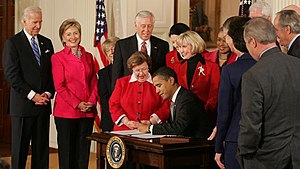
Women seemingly always have fought an uphill battle in the fight for wage equality with their male counterparts. As the number of women in the workforce has increased over the years, that gap between male and female wage earners has gotten narrower, but the gulf is still perhaps too wide compared to what it should be. Some correctly argue that any wage gap based solely on gender should not occur, especially in today’s society. Any difference in earnings of this nature falls under the category of discrimination in the workplace and has no legal reason to be allowed.
While President Obama has gained praise for his support of reducing this pay gap and supporting legislation like the Lilly Ledbetter Fair Play Act, a law that makes it easier for women to sue over pay discrimination, he has come under fire recently after a study of his staff in the white house has revealed that he pays his male staffers more than his female staffers. The numbers show that women staffers earn about eighty-seven percent of that of their male counterparts ($71,000 to $62,000), while the national average in 2011, according to the Bureau of Labor and Statistics (BLS), was around eighty percent.
Despite this example of potential discrimination from our nation’s highest office, the president and his predecessors’ support of pay equality has allowed for several advancements that are evident with the latest numbers. Younger women (aged 25-34) have narrowed the gap substantially to about ninety-two percent according to the 2011 numbers. Several legislative acts, such as the Pregnancy Discrimination Act of 1978 and the Family and Medical Leave Act of 1993, have made it more difficult for employers to discriminate against women when it comes to their needing to miss time due to pregnancies. However, women are still more likely than men to take unpaid time off of work to deal with sickness or other parenting issues in a family, a fact which reduces their wages by default.
While it is becoming harder and harder for employers to discriminate against women in their pay, the fact remains that it still happens. When it does, it is important to have the best legal representation possible to ensure that your rights are protected. The Law offices of Valli, Kane, and Vagnini are specially equipped to help any victim of this or any other kind of discrimination in the workplace. Contact them for a free consultation to make sure that your rights are protected.
Will Obama End Employment Discrimination?
President Obama seems to hold the key which unlocked the door to his victory. What is the key to his success you ask? Simply addressing long lasting social issues. Close to two times as many women than men find concerns like same-sex marriage, abortion, and Employment Discrimination as the most important issues that determined their vote, based on recently reported polling information.
When it comes to discrimination in the workplace, Presidents over the years have issued orders to protect workers against it. In 1941 President Roosevelt issued an order that prevented discrimination against any worker because of their race, creed and national origin. The Civil Rights Act of 1964 was released two decades later, which outlaws employment discrimination based on religion, sex and race. Since Obama has been in office, he has addressed issues of employment discrimination and in 2011 he agreed to pass the Employment Non-Discrimination Act. He abolished “Don’t Ask, Don’t Tell” and openly supports the gay community and same sex marriage. That’s great for Obama, but what about the rest of the country? As it stands today, 21 states have outlawed sexual-orientation discrimination, while 16 also forbid gender-identity discrimination, and many cities and counties have similar nondiscrimination laws. But only about half of the population of the United States lives in places with such laws, which leaves millions of workers undefendable against discrimination.
Who is being Discriminated Against?
Nowadays, even though the world has widely accepted individuality and self expression, discrimination against women in the workplace still occurs. It is also distributed amongst lesbians, gays, bisexuals and transgendered people. A recent research study found that in the last five years, 27% of lesbian, gay or bisexual people had been harassed at work or lost a job because of their sexual orientation. In addition to that, half of transgender people had experienced discrimination in hiring, promotion or job retention. Discrimination can also be found in their paychecks. Studies also show that they earn less than heterosexual men with the same qualifications. Pay discrimination can also be found with women who, despite holding the same positions as men, are receiving less pay than men for doing the same job. Even though studies also show that there are more women attending colleges than men, women are still given less of a chance at flourishing financially in comparison to men in the workplace.
What Can Be Done?
There is currently a Democratic bill that has long been sitting in Congress, which Obama supports, called the Paycheck Fairness Act. The Paycheck Fairness Act would require employers to show that any salary differences between men and women doing the same job are not gender-related. The bill also would have prohibited employers from retaliating against employees who share salary information with their co-workers. The bill never passed because it could not gain the support of the Republican party.

